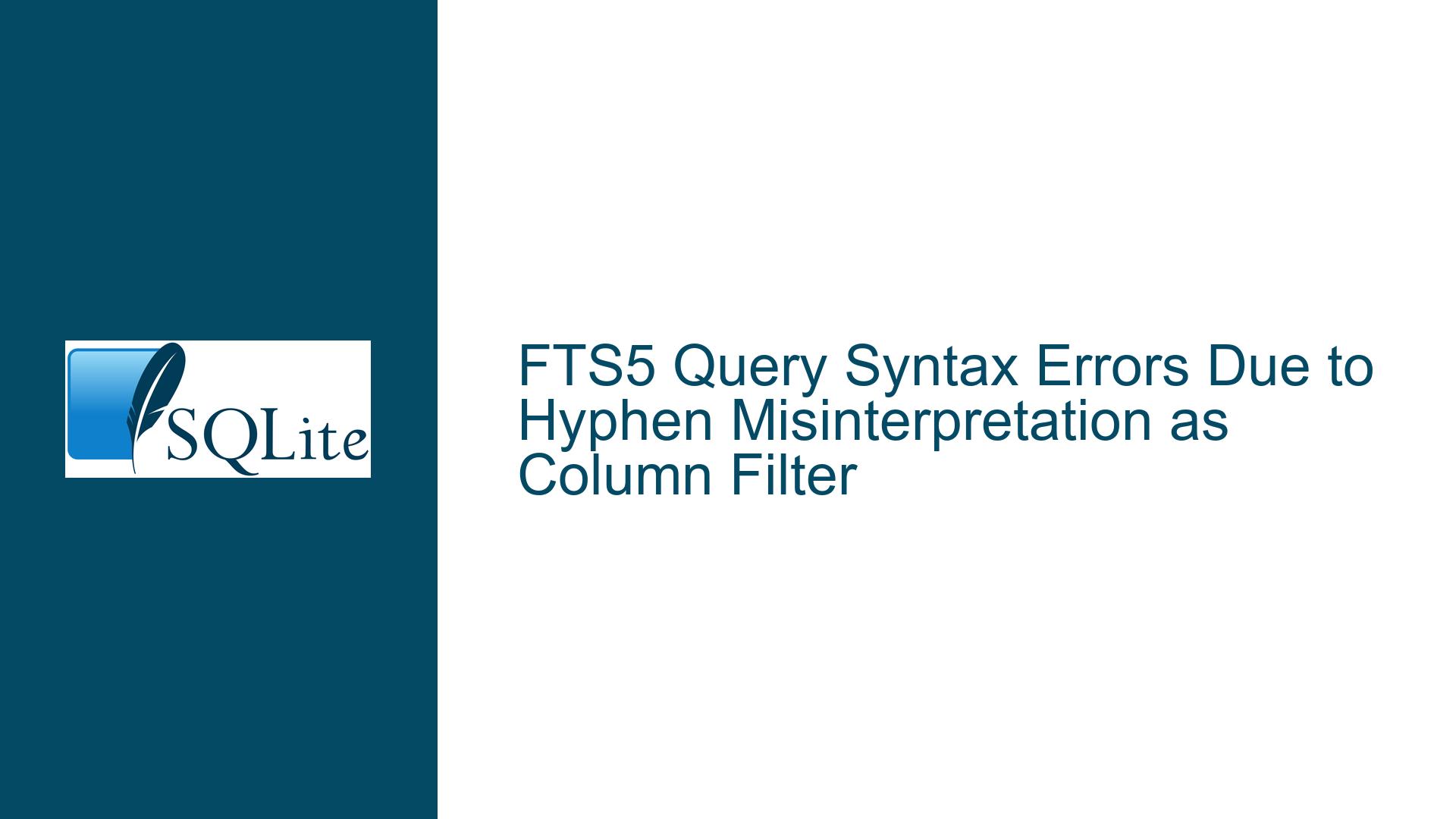FTS5 Query Syntax Errors Due to Hyphen Misinterpretation as Column Filter
Understanding FTS5 Hyphen Parsing and Column Filter Confusion
The core challenge arises when FTS5 interprets hyphens in search terms as column filter operators. A query like hello-world triggers errors because FTS5 parses -world as an attempt to apply a column filter. This occurs due to FTS5’s syntax rules where the + and - symbols prefix column names in search expressions. When a hyphen precedes text without a colon and filter expression (e.g., -world:value), FTS5 assumes the user is referencing a column named world but encounters incomplete syntax. The errors manifest in two ways:
- If no column named
worldexists:no such column: world - If a
worldcolumn exists:fts5: syntax error near ""
This behavior stems from FTS5’s tokenization rules and operator precedence. Hyphens are not inherently treated as term separators in FTS5; instead, they are parsed as operators when they appear at the start of a token. The parser does not require whitespace before a hyphen, allowing it to bind to subsequent characters as a column filter operator. This conflicts with use cases where hyphens are part of search terms (e.g., hyphenated words, product codes).
Hyphen Ambiguity in FTS5 Query Parsing
Three primary factors contribute to this issue:
Operator Precedence Without Contextual Awareness
FTS5’s parser prioritizes operator detection over term tokenization. When a hyphen appears in a query, the parser first checks if it is part of a column filter operation (+column:termor-column:term). Since hyphens can be valid term characters (e.g., inuser-generated), the lack of whitespace before the hyphen creates ambiguity. The parser assumes the hyphen is an operator unless explicitly escaped or enclosed in quotes.Column Name Validation Before Term Processing
FTS5 validates column names before evaluating whether the operator syntax is complete. Inhello-world, the-worldsegment is parsed as a column filter. The parser checks for the existence of aworldcolumn. If it does not exist, the errorno such columnis thrown immediately. Ifworldexists, the parser expects a colon and filter expression (e.g.,-world:value), resulting in a syntax error when absent.Default Tokenizer Behavior
FTS5’s default tokenizer splits terms at whitespace and punctuation boundaries, but hyphens are not always treated as term separators. For example,hello-worldmay be tokenized ashelloandworldif the tokenizer is configured to split on hyphens. However, the parser’s operator logic takes precedence over tokenization, leading to misinterpretation before tokenization completes.
Resolving Hyphen-Related Errors in FTS5 Queries
Step 1: Escape Hyphens to Disable Operator Parsing
Prepend a backslash (\) to hyphens intended as literal characters:
SELECT * FROM fts_table WHERE fts_table MATCH 'hello\-world';
This forces FTS5 to treat the hyphen as part of the term rather than an operator. Escaping is critical for terms like user-generated or double-barreled.
Step 2: Enclose Hyphenated Terms in Quotes
Use double quotes to preserve hyphens as term characters:
SELECT * FROM fts_table WHERE fts_table MATCH '"hello-world"';
Quoting ensures the entire phrase is treated as a single token, bypassing operator parsing. This is effective for exact matches but may not work with prefix searches or wildcards.
Step 3: Modify Tokenizer Rules (Advanced)
Create a custom tokenizer that treats hyphens as part of terms. For example, use the porter tokenizer with separators option:
CREATE VIRTUAL TABLE fts_table USING fts5(
content,
tokenize='porter separators "-"'
);
This configuration instructs FTS5 to split terms only at whitespace, preserving hyphens within tokens.
Step 4: Validate Column Names and Query Syntax
Ensure column names do not conflict with terms that may follow hyphens. If a column named world exists, refactor queries to avoid ambiguous syntax:
-- Use explicit column filters with proper syntax:
SELECT * FROM fts_table WHERE fts_table MATCH 'hello -world:value';
Step 5: Implement Application-Side Query Sanitization
Preprocess user input to escape hyphens or replace them with underscores when appropriate. For example, in Python:
query = user_input.replace("-", r"\-")
This mitigates parsing errors caused by untrusted input.
Step 6: Leverage FTS5’s Phrase Search
Use phrase search with NEAR operators to handle hyphen-like semantics:
SELECT * FROM fts_table WHERE fts_table MATCH 'hello NEAR/1 world';
This approach avoids hyphens altogether while maintaining proximity requirements.
Step 7: Update FTS5 to Latest Version (If Applicable)
While FTS5’s core behavior is stable, check for updates to SQLite that might improve error messages or parsing logic.
By systematically applying these fixes, developers can resolve hyphen-induced parsing errors and ensure FTS5 queries behave as intended.






